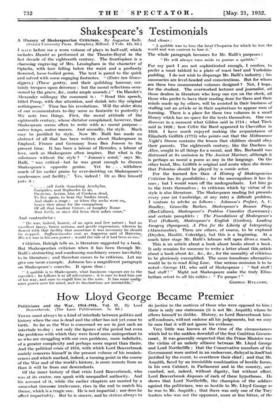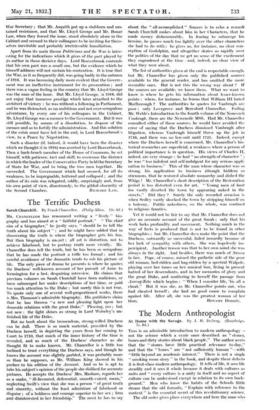How Lloyd George Became Premier
Politicians and
Beaverbrook. Tinxiii must always be a kind of interlude between polities and history when the one is dead and the other has not yet come to birth. So far as the War is concerned we are in just such an interlude to-day ; not only the figures of the period but even the problems with which they were faced seem unimportant to us who are struggling with our own problems, more indefinite, of a greater complexity and perhaps more urgent than theirs. And the political crisis of 1916, with which Lord Beaverbrook mainly-concerns himself in. the present volume of his reminis- cences and which marked, indeed, a turning point in the course of the War and of the world's history, is more remote from us than it will be from our descendants.
Of the inner history of that crisis Lord Beaverbrook, who was at its centre, can speak with unequalled authority. And his account of it, while the earlier chapters are marred by a somewhat tiresome irrelevance, rises in end to match his theme, which is a tragic one. He is not impartial ; nor does he affect impartiality. But he is sincere, and he strives always to
the War, 1914-1916. Vol. II. By Lord do justice to the motives of those who were opposed to him ;
(The Lane Publications. 75. 6d.) there is only one statesman (it is not Mr. Asquith) whom he allows himself to dislike. History, as Lord Beaverbrook him- self confesses, will not endorse all his judgements, but we may be sure that it will not ignore his evidence.
Very little was known at the time of the circumstances which led to the sudden downfall of the first Coalition Govern- ment. It was generally suspected that the Prime Minister was the victim of an unholy alliance between Mr. Lloyd George and Lord Northcliffe ; that the Conservative members of the Governinent were united in an endeavour, disloyal in itself but justified by the event, to overthrow their chief ; and that Mr. Asquith, faced by an irresistible combination of hostile forces, in his own Cabinet, in Parliament and in the country, suc- cumbed, not, indeed, without dignity, but without effort. Lord Beaverbrook disposes of each of these hypotheses. He shows that Lord Northcliffe, the champion of the soldiers against the politicians, was as hostile to Mr. Lloyd George as he was to Mr. Asquith ; that there was only one of the Tory leaders who was not the opponent, more or less bitter, of the
War Secretary ; •that Mr. Asquith put up a stubborn and sus- tained resistance, and that Mr. Lloyd George and Mr. Honor Law, when they forced the issue, stood absolutely alone in the Cabinet and seemed to their colleagues to be inviting for them- selves inevitable and probably irretrievable humiliation.
Apart from its main theme Politicians and the War is inter- esting for. the indications which it gives of the part played by its author in those decisive days. Lord Beaverbrook contends that his own part was a small one, but the evidence which he himself adduces will not sustain his contention. It is true that the War, as it so frequently did, was going badly in the autumn of 1916. It was becoming daily more evident that the Govern- ment was an ineffective instrument for its prosecution ; and there was a vague feeling in the country that Mr. Lloyd George was the man of the hour. But Mr. Lloyd Georg,o, 1916, did not enjoy that immense prestige which later attached to the architect of victory ; he was without a following in Parliament, and he was distrusted, as an ambitious and not over-scrupulous adventurer, by every one of his colleagues in the Cabinet. Mr. Lloyd George was a menace to the Government. But it was still possible, by means of a dissolution, to dispose of the menace and so to fortify the administration. And this solution of the crisis must have led in the end, in Lord Beaverbrook's view, to a Peace by Negotiation.
Such a disaster (if, indeed, it would have been the disaster which we thought it in 1916) was averted by Lord Beaverbrook. Then a back-bench member of the House of Commons, he set himself, with patience, tact and skill, to overcome the distrust in which the-leader of the Conservative Party held the Secretary of State for.War, and to bring the two men together. He succeeded. The Government which had seemed, for all its weakness, to be impregnable, tottered and collapsed ; and the author of its ruin was relegated, oddly, surprisingly and, from his own point of view, disastrously, to the gilded obscurity of





































 Previous page
Previous page